I couldn’t help wonder fleetingly whether András had chosen this spot because we were extremely unlikely to be overheard. More probably, it was simply convenient. Unable to shake off a feeling of self-consciousness which came from undertaking a journalistic project in a country which represses journalism, I ordered one of the unusual smoothies and left my recording device, for the moment, in my pocket.
When he came, András Dési was tall, softly-spoken, warm yet difficult to read, with excellent English and a small terrier. We shook hands and, after I had made admiring remarks about his dog and persuaded him that a 550-Forint coffee was the least I could do to thank him for taking the time to meet me, it wasn’t long before we cut to the chase; discussing the freedom of the press in Hungary. Or rather, the lack thereof.
“There is a massive distortion of the media by the Hungarian government. But not all of it is obvious,” András told me. “You have to distinguish between what is ‘free’ and what is ‘independent’. If you have state advertising for your media, even if your outlet is not state-controlled, you are compromised. Yet the largest advertiser is the Hungarian state. When you include advertising by state-owned companies, the state accounts for virtually all advertising, particularly in the political press. Private companies take a distance because they don’t want to be seen to be involved with media which might not be government-friendly – they fear retaliation.”
The freedom of the press in Hungary was the first tree to which the current Hungarian administration, freshly elected in 2010 and led by the authoritarian-minded Viktor Orbán, took an axe. Enjoying a two-thirds supermajority in the Parliament, Orbán’s Fidesz party was able to push through a “media law”, which gave the government sweeping powers to regulate the news. A National Media and Infocommunications Authority was created for this purpose – a bureaucratic-sounding title which doesn’t let on that it is entirely run by Orbán yes-men. Since then, around 80% of the media has come under heavy government influence, if not outright control. How have these been possible?
“Partly, it’s because Hungarian people don’t care about the freedom of the press,” András explained regretfully. “To understand why, you have to look to the roots of political change in this country. In Hungary, the transition after the fall of communism went smoothly, without any great pressure from the people. In other countries, like East Germany, citizens had to fight much more to achieve change. In Hungary, there has not really been any democratic education.”
Slightly hesitantly, conscious that I was entering sensitive territory, I asked him what happened to his own newspaper. The tone of the conversation shifted perceptibly, from matter-of-fact to personal. “It’s a sad story,” he says, with a forced half-smile, glancing away from me for the first time and down along the street. “It was three years ago and it still hurts. It was as sudden as an assassination - and that’s what it was.
“One week in 2016, we were told we had to move offices. By the Friday afternoon we had packed everything up in boxes, ready to move to a new building on Saturday. The next morning, on the day of the move, I happened to be in a supermarket at 9am when I received a call from a colleague. He said, ‘Listen, I have some bad news.’ His voice was so serious that I answered, ‘Who’s dead?’ He replied, ‘Népszabadság is dead.’ ”
András paused for effect, his piercing blue eyes glimmering briefly. “We soon realised the move to new offices was a cover, to distract everyone and to account for the closure of the office space. The owner and managers suspended both print and online content, a suspension which became permanent.”
I sipped my smoothie and decided kiwis and carrots should not be allowed within three feet of each other. I asked András what had happened behind the scenes.
“I don’t have any evidence,” he admitted. “But I do know that the owner, business manager and key investors of Népszabadság met the Prime Minister in June 2016. I imagine that the government initially wanted to acquire the newspaper, but it did not fit with the rest of Orbán’s media empire. I think the owner of the publishing company would have been prepared to sell for good money, but instead was told to ‘take care’ of the newspaper. We’ve all seen the mafia movies – we know what it means when someone is told to ‘take care’ of someone.”
A noisy moped rumbled past, and the businessmen at the table next to us stubbed out their cigarettes and moved on. I waited, hooked on András’ every word, sensing that he would tell me more in his own time. His coffee, barely touched, grew cool at his elbow while he thought.
“Népszabadság was a left-leaning liberal paper, and it was inconvenient to the government. We had a small team of dedicated investigative journalists who revealed a string of corruption scandals among high-up officials. When we published these stories, they spread like a bushfire. Népszabadság was a national newspaper, well-read and well-respected. Its closure was disturbing, extremely disturbing, and sent a threatening message to other media.”
And going forward? I mentioned that I found the EU’s reaction to the deepening crisis in Hungary inadequate. Despite the European Parliament voting to trigger Article 7, a mechanism designed to punish a country for failing to respect EU values and tempt it back on to the straight and narrow, the freedom of the press has continually worsened over time.
“It’s not up to the EU or anyone else to change the situation,” András answered. “It’s up to the Hungarian people to elect a new government…”
“But,” I couldn’t help interrupting, “doesn’t it make it hard to elect a new government if it’s hard for people to inform themselves with accurate information from diverse and independent media sources?”
András shrugged. “Many people expected that after two terms, the grip of the regime would slacken. But it has tightened. We are realising that Orbán wants to rule until at least 2030 and the government wants more and more. But one day they will realise they can’t control everything, and there is something boiling, boiling, under the surface. In Hungary, we have survived other dictatorships and autocracies – the Ottomans, the Habsburgs, the Nazis and the Communists, and we will survive this one. The economic roots of this regime are strong, and they have the media. But sooner or later something will give.
“In the meantime, my fellow Hungarians tolerate the regime because it provides stability. Any kind of change could disrupt this stability and have tragic consequences. So for now, Hungary opts for stability.”
Our discussion had reached a natural conclusion. András stood up and drained his coffee, and I stood too. I admired his courage and worried for his country. He shook my hand again and smiled.
“I’ll support him if he does,” he said, “but I hope my son doesn’t choose journalism.”


Follow the comments: |
|
